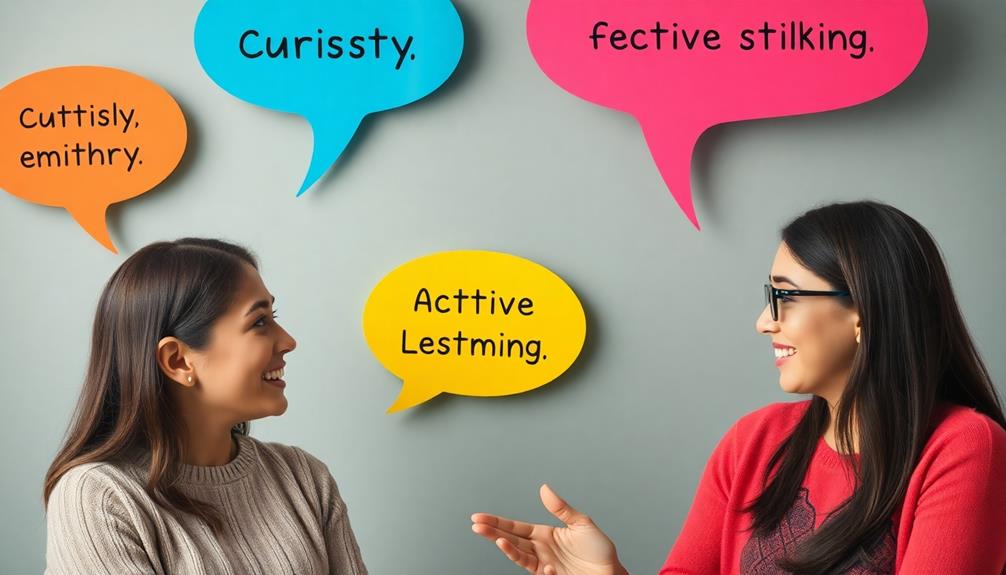Curiosity is essential for effective communication because it drives active listening and encourages open-ended questions. When you're curious, you're more open to diverse perspectives, which helps build trust and empathy. This approach fosters collaboration and reduces defensiveness during conversations, making problem-solving easier. Curiosity also empowers you to engage in thoughtful reflections and ask deeper questions, enhancing emotional intelligence. As you seek to understand others better, you not only strengthen your connections but also create a safer space for dialogue. Keep exploring how curiosity can enrich your communication skills even further.
Key Takeaways
- Curiosity enhances active listening, allowing individuals to fully understand diverse perspectives and respond thoughtfully during conversations.
- Open-ended questions foster deeper insights, encouraging richer discussions and promoting creative problem-solving within teams.
- A curious mindset creates psychological safety, empowering individuals to share ideas without fear of judgment, leading to collaboration and innovation.
- Curiosity helps de-escalate conflicts by inviting exploration of underlying motivations, promoting understanding and strengthening relationships.
- Engaging with curiosity increases empathy, building stronger interpersonal connections and reducing misunderstandings in communication.
Understanding Curiosity's Role

Curiosity sparks meaningful conversations and transforms the way we communicate. When you embrace curiosity, you enhance your ability to listen actively and ask open-ended questions. This approach is vital for understanding diverse perspectives and building trust with others.
By fostering a curious mindset, you encourage deeper reflections and insights, prompting more thoughtful responses during discussions. Additionally, engaging in online communities can provide valuable opportunities for collaboration and resource sharing, as the power of online communities supports the exchange of ideas and enhances learning.
In environments where curiosity thrives, people feel more inclined to share their ideas openly and admit mistakes. This openness is essential for cultivating a culture that supports effective communication.
Shifting your focus from ego to understanding others' behaviors and motivations helps manage interpersonal conflicts, paving the way for constructive dialogues and reducing defensiveness.
Curiosity isn't just a tool for better communication; it's a keystone habit for your professional growth. As you improve your communication skills through curiosity, you'll likely experience increased happiness and fulfillment, enriching your interpersonal interactions.
Curiosity and Psychological Safety

A team's success hinges on its members feeling psychologically safe, which allows curiosity to flourish. When you and your teammates can express ideas and admit mistakes without fear, you create an environment rich in curiosity.
Google's 2015 study highlights psychological safety as a key factor in team effectiveness, showing that such an environment leads to better retention rates, increased revenue, and higher executive effectiveness ratings. Additionally, fostering a culture of ethical leadership in business can greatly enhance psychological safety, as it promotes trust and accountability among team members.
In psychologically safe spaces, curiosity drives the sharing of diverse ideas, enhancing innovation and problem-solving capabilities. You'll find that when you feel secure, your curiosity encourages open dialogue and exploration of differing viewpoints, which strengthens collaboration and understanding among team members.
Moreover, curiosity is crucial in resolving conflicts within these safe environments. It invites you to explore underlying motivations and behaviors without defensiveness, promoting constructive discussions.
As you foster psychological safety, you empower your team to ask questions and seek clarity, ultimately leading to more effective communication. So, embrace curiosity and nurture a psychologically safe atmosphere—it's essential for your team's growth and success.
Enhancing Conflict Resolution

Effective conflict resolution hinges on the ability to approach disagreements with an open mind. When you cultivate curiosity, you're more likely to understand differing perspectives, which can lead to more effective communication.
Instead of getting defensive, curiosity invites collaboration, helping to reduce emotional escalation during conflicts.
Here are some ways curiosity enhances conflict resolution:
- Ask open-ended questions to uncover underlying motivations.
- Practice active listening to show you value the other person's input.
- Encourage a safe space for sharing ideas and admitting mistakes.
- Focus on problem-solving rather than winning the argument.
- Foster empathy to strengthen relationships and promote understanding.
The Amygdala's Influence

Although the amygdala often operates below your conscious awareness, its influence on communication can be profound. This small but powerful brain structure processes emotional memories and triggers rapid, unconscious decisions, especially when you perceive threats during conversations.
When you feel your self-worth is at stake, the amygdala can initiate defensive communication patterns, escalating conflicts instead of resolving them.
However, curiosity can help you override these defensive responses. By shifting your focus from protecting your ego to genuinely wanting to understand others, you create a space for more constructive dialogue.
Simple questions posed from a place of curiosity can de-escalate potential conflicts, making others feel safe to express their thoughts without fear of attack.
When you engage your curiosity during conversations, you activate rational thinking, which helps reduce the emotional intensity driven by the amygdala's reactions.
Instead of reacting defensively, you can foster an environment where open communication thrives. By cultivating curiosity, you not only enhance your understanding of others but also transform potentially volatile interactions into opportunities for connection and resolution.
Benefits of Nurturing Curiosity

Nurturing curiosity can greatly enhance your ability to build strong relationships by fostering empathy and understanding.
By engaging with others and asking thoughtful questions, you create an atmosphere where people feel valued and heard, leading to more productive conversations.
When you approach conversations with an open mind, you encourage more honest communication, which strengthens connections.
This attitude not only enriches your interactions but also promotes a collaborative atmosphere in your personal and professional life.
Embracing actionable tips and strategies can further amplify this effect, allowing you to connect more deeply with others.
Enhances Relationship Building
Curiosity plays an essential role in enhancing relationship building by fostering deeper understanding among individuals. When you nurture your curiosity, you actively seek out and appreciate diverse perspectives and experiences, which can greatly enrich your interactions.
By engaging with others' thoughts and feelings, you create meaningful connections that strengthen interpersonal bonds.
Here are some ways curiosity enhances relationship building:
- Promotes mutual respect: You learn to value differing opinions, which can transform potential conflicts into constructive discussions.
- Encourages open dialogue: A curiosity-driven approach creates a safe space for sharing thoughts, boosting trust and collaboration.
- Fosters continuous learning: Engaging with others' experiences leads to personal growth and deeper connections.
- Strengthens cooperation: Curiosity encourages teamwork, making it easier to navigate challenges together.
- Increases empathy: As you understand others better, you connect more profoundly, enriching your relationships.
Fosters Empathy and Understanding
By fostering a genuine desire to understand others, you open the door to deeper empathy and understanding in your relationships. Curiosity encourages you to seek out the experiences and perspectives of those around you. This active engagement not only strengthens interpersonal connections but also fosters empathy.
| Curiosity Action | Benefit | Result |
|---|---|---|
| Ask open-ended questions | Encourages sharing of experiences | Uncovers common ground |
| Practice active listening | Enhances comprehension | Reduces misunderstandings |
| Seek shared values | Builds mutual respect | Strengthens relationships |
When you engage with others through curiosity, you create opportunities for dialogue that can transform potential conflicts into constructive discussions. By understanding differing viewpoints, you promote collaboration and resolution. Continuous learning through curiosity helps build your emotional intelligence, which is essential for effective communication.
Ultimately, nurturing your curiosity allows you to foster empathy, enhancing both your personal and professional relationships. As you deepen your understanding of others, you'll find that your communication becomes more impactful and meaningful. This commitment to empathy not only enriches your life but also creates a positive ripple effect in your community.
Encourages Open Communication
When you embrace curiosity in your conversations, you create an inviting space where people feel comfortable sharing their thoughts and ideas. This openness fosters honest dialogue, encouraging individuals to express their unique perspectives.
By nurturing curiosity, you enhance your active listening skills, allowing for deeper connections and collaboration.
Here are some benefits of encouraging open communication through curiosity:
- Safe Environment: People feel secure to share their opinions without judgment.
- Diverse Perspectives: Curiosity promotes the sharing of different viewpoints, enriching discussions.
- Deeper Insights: Asking open-ended questions leads to more profound reflections and problem-solving.
- Enhanced Creativity: Varied ideas contribute to innovative solutions within teams.
- Increased Engagement: A culture valuing curiosity boosts employee satisfaction and involvement.
When you ask questions, you invite others to join the conversation, making it more engaging and collaborative.
By fostering an open communication environment, you not only build trust but also empower everyone to contribute meaningfully.
Ultimately, this curiosity-driven approach leads to more effective and fruitful interactions.
Power of Questions

Questions are powerful tools that can help you build trust and foster creativity in conversations.
By asking the right questions, you encourage deeper insights and create an environment where ideas can flourish.
When you approach questioning with a supportive tone, you not only enhance understanding but also strengthen connections with others.
Building Trust Through Questions
Effective communication relies heavily on the power of inquiry, as asking the right questions can greatly enhance trust in your relationships. When you ask better questions, you show genuine interest in others' perspectives and experiences, which fosters authentic connections.
Open-ended questions, in particular, encourage deeper reflections and insights, essential for building trust.
Here are some key benefits of engaging in effective questioning:
- Demonstrates genuine interest: Your curiosity signals that you value others' input.
- Encourages deeper conversations: Open-ended questions lead to richer discussions.
- Fosters a culture of inquiry: This creates an environment where team members feel safe to share ideas.
- Enhances collaboration: Thoughtful questions boost teamwork and creativity.
- Strengthens relationships: Trust grows when people feel heard and appreciated.
Research shows that asking thoughtful questions not only enhances understanding but also reinforces trust in your communication exchanges.
As a leader, mastering the ability to ask impactful questions cultivates an atmosphere where everyone feels comfortable expressing their ideas and concerns, solidifying trust further.
Embrace the power of questions, and watch your relationships flourish.
Enhancing Creativity and Insights
Curiosity acts as a catalyst for creativity, sparking innovative ideas and insights within teams. When you ask questions, you create an open dialogue that enhances your communication skills. Open-ended questions invite your colleagues to reflect and explore diverse perspectives, fostering an environment where creativity can thrive.
Instead of settling for superficial exchanges, you can elevate conversations to meaningful dialogues that generate new ideas and solutions for complex problems. By engaging with curiosity through thoughtful questioning, you deepen relationships and build trust, paving the way for a collaborative atmosphere.
This is where insights flourish—when team members feel safe to share their thoughts, knowing their ideas are valued. Research shows that effective questioning techniques, like the "killer last question," can elicit valuable insights that drive creativity and improve decision-making outcomes.
In this dynamic, you harness the power of questions to reveal hidden potential within your team. Embrace this approach, and watch how your creative processes become more robust, leading to innovative solutions and enhanced collaboration.
In the end, your curiosity not only enriches your communication skills but also transforms the way your team interacts and innovates together.
Techniques for Effective Questioning

In today's fast-paced world, mastering the art of questioning can transform your conversations. When you focus on effective questioning techniques, you create a space for meaningful dialogue and deeper connections.
Here are some techniques to enhance your skills in asking questions:
- Understand your audience: Tailor your inquiries to resonate with their values and experiences.
- Use open-ended questions: Encourage deeper reflections that lead to richer insights and creative problem-solving.
- Implement the "killer last question": This technique prompts critical thinking, often resulting in unexpected and enriching responses.
- Embrace silence: After asking a question, give others time to process their thoughts. This encourages more thoughtful and in-depth answers.
- Stay flexible: Be prepared to explore unexpected topics while keeping the focus on key issues that drive the conversation forward.
Tone and Behavior Impact

Communication thrives on the nuances of tone and behavior, shaping how messages are received and understood. Your tone plays a significant role in how questions are perceived. A supportive tone enhances the likelihood of positive engagement, while a negative tone can lead to misunderstandings or defensiveness. It's vital to be mindful of how you phrase your questions and the tone you use when doing so.
Additionally, your behavior during conversations matters just as much. Maintaining open body language and a calm demeanor fosters trust and rapport, making others feel comfortable engaging with you. Conversely, negative behavior can create barriers, isolating you in professional settings.
Self-awareness regarding your tone and behavior is important. It helps you understand your impact on others and promotes effective communication and relationship-building. By consistently exhibiting positive behavior, you not only enhance your professional reputation but also encourage others to engage openly.
This creates a more collaborative environment where everyone feels valued. Remember, the way you communicate—your tone and behavior—directly affects the quality of responses you receive, making it important to approach every interaction thoughtfully.
Overcoming Challenges in Communication

Steering through the challenges of effective communication requires a willingness to embrace curiosity. When you approach conversations with an open mind, you can overcome the fear of looking unprepared or foolish. Curiosity helps you challenge your assumptions and explore fresh ideas, which fosters an inclusive dialogue.
Here are some ways to harness curiosity for better communication:
- Ask open-ended questions to stimulate discussion.
- Listen actively to understand different perspectives.
- Create a supportive environment that encourages sharing.
- Reflect on past experiences to identify what held you back.
- Practice empathy to connect with others on a deeper level.
Recognizing the impact of your environment on communication can enhance your curiosity, enabling you to engage with differing viewpoints without judgment.
By cultivating curiosity within yourself and your team, you'll boost emotional intelligence and empathy, essential tools for resolving misunderstandings and promoting collaboration.
When you let curiosity guide your interactions, you'll turn communication challenges into opportunities for growth and connection.
Curiosity's Influence on Leadership

As a leader, your curiosity can create an environment where open dialogue thrives, leading to stronger team connections.
When you ask questions and encourage exploration, you not only boost engagement but also spark innovation.
This approach helps everyone feel valued, fostering a collaborative atmosphere that drives success.
Fostering Open Dialogue
Curiosity plays a pivotal role in fostering open dialogue within teams, as it invites everyone to share their thoughts and ideas without hesitation. When leaders embrace curiosity, they create a psychologically safe environment, allowing for effective communication and minimizing communication breaks.
By asking questions and actively listening, you encourage collaboration and a diverse range of perspectives that lead to innovative solutions.
Here are some key benefits of fostering open dialogue through curiosity:
- Enhanced collaboration: Team members feel valued and engaged.
- Stronger relationships: Understanding individual motivations and strengths promotes connection.
- Growth through discomfort: Embracing uncomfortable conversations leads to growth and development.
- Increased employee engagement: When people can speak freely, they're more invested in the team's success.
- Improved performance metrics: Open dialogue stimulates discussions that boost overall team effectiveness.
When you implement practices that promote curiosity, like brainstorming sessions, you not only stimulate discussion but also strengthen team cohesion.
Enhancing Team Connections
Through curiosity, leaders can greatly enhance team connections, creating a more engaged and cohesive work environment. When you foster a culture of open dialogue, team engagement naturally increases, leading to improved collaboration essential for success.
By actively asking questions and seeking diverse perspectives, you can drive innovation and problem-solving within your team.
Research shows that teams with high psychological safety—often cultivated through curiosity—experience better retention rates and improved performance metrics. This safety allows team members to express their thoughts and ideas freely, deepening connections and understanding individual strengths and motivations.
As a leader, you should embrace curiosity as a tool for continuous learning and skill development. Make suggestions that encourage team members to share their insights and experiences, fostering an environment where everyone feels valued.
This not only strengthens team dynamics but also enhances your adaptability in changing environments.
Ultimately, by leading with curiosity, you'll create a workplace that thrives on collaboration, innovation, and strong interpersonal connections, setting the stage for long-term success.
Frequently Asked Questions
Why Is Curiosity Essential?
Curiosity's essential because it drives your desire to learn and understand more about the world around you.
When you ask questions and seek new experiences, you open yourself up to diverse perspectives and ideas. This willingness to explore helps you connect with others on a deeper level, fostering relationships and enhancing collaboration.
What Is Curiosity and Why It Is Most Important for Success?
Curiosity's like a flame that ignites your desire to learn, illuminating paths you never knew existed.
It's the secret ingredient for success, pushing you to explore new ideas and challenge the status quo.
When you're curious, you ask questions that lead to deeper understanding, fostering innovation and creativity.
This relentless pursuit of knowledge not only enriches your life but also opens doors, enabling you to connect meaningfully with others and thrive in any environment.
Why Is Curiosity Communication's Secret Weapon?
Curiosity's your secret weapon in communication because it drives you to ask questions and seek deeper understanding.
When you engage with others, your curiosity opens doors to new perspectives, fostering connection and reducing misunderstandings.
By actively listening and exploring different viewpoints, you create a space for empathy and collaboration.
This not only enriches conversations but also helps you navigate conflicts, making interactions more constructive and meaningful for everyone involved.
Why Is Curiosity so Powerful?
Why's curiosity so powerful? It fuels your desire to learn and understand the world around you.
When you ask questions and explore new ideas, you open doors to deeper knowledge and insight. This mindset not only enhances your personal growth but also strengthens your relationships.
Conclusion
In a world where instant messaging rules, curiosity remains your greatest asset for effective communication. By fostering an inquisitive mindset, you not only create psychological safety but also enhance conflict resolution and leadership. Embrace questioning and pay attention to your tone, because genuine curiosity opens doors to understanding. Remember, just like a compass guides explorers, your curiosity can navigate conversations, transforming them into meaningful connections. So, keep that spark alive—it's the key to thriving in any dialogue.









